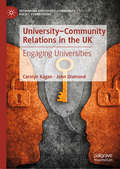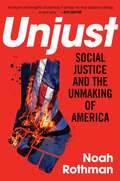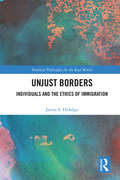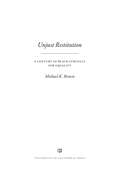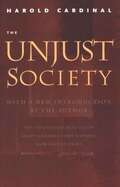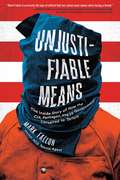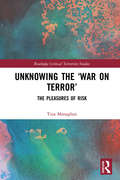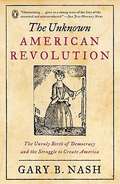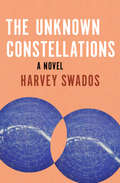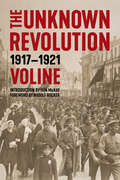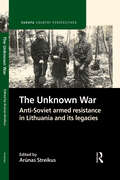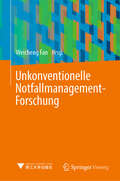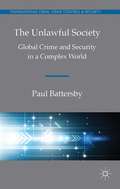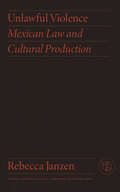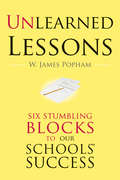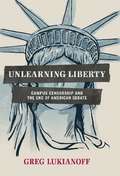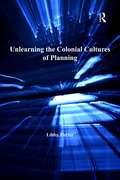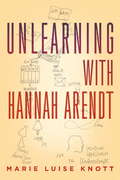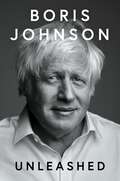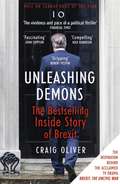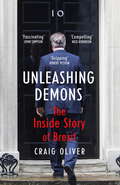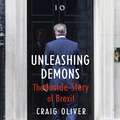- Table View
- List View
University–Community Relations in the UK: Engaging Universities (Rethinking University-Community Policy Connections)
by Carolyn Kagan John Diamond“This is a fascinating, scholarly and informative synthesis of the history of UK community-university engagement and will be essential reading for anyone who wants to make sense of the past in order to progress future agendas in this area. A great read.”—Angie Hart, Academic Director, Community University Partnership Programme, University of Brighton, UK“This book is pertinent for an in-depth understanding of University-Community partnerships that challenge all European Universities. The notions of engagement, reciprocity or mutuality differ according to the socio-political context, civic traditions and social policies of the European regions. This book is a must read for those who want to make a difference in their Universities and their Communities.”—Maria Vargas-Moniz, President of the European Community Psychology Association.“Kagan and Diamond’s analysis of University-Community engagement in England, is highly relevant for the challenges facing higher education in many places but particularly in Mexico where higher education has to move from existing verticality and authoritarianism, to become socially more relevant.”—Eduardo Almeida Acosta, Universidad Iberoamericana, Mexico.This book examines and analyses the complex and contradictory relationships between Higher Education Institutions in England and their local communities within a wider political and policy context. It provides an overview of the UK university system which has a long tradition of a mixed pattern of relationships with communities. The book critically explores the academic spheres of teaching and learning, third stream activities and research, showing how the ways in which different initiatives supported by national policy and funding bodies have shaped the relationship universities have with their communities as well as the opportunities and challenges institutions now face to develop and transform these relationships.
Unjust: Social Justice and the Unmaking of America
by Noah Rothman"An elegant and thoughtful dismantling of perhaps the most dangerous ideology at work today." — BEN SHAPIRO, bestselling author and host of "The Ben Shapiro Show" "Reading Noah Rothman is like a workout for your brain." — DANA PERINO, bestselling author and former press secretary to President George W. Bush There are just two problems with “social justice”: it’s not social and it’s not just. Rather, it is a toxic ideology that encourages division, anger, and vengeance. In this penetrating work, Commentary editor and MSNBC contributor Noah Rothman uncovers the real motives behind the social justice movement and explains why, despite its occasionally ludicrous public face, it is a threat to be taken seriously. American political parties were once defined by their ideals. That idealism, however, is now imperiled by an obsession with the demographic categories of race, sex, ethnicity, and sexual orientation, which supposedly constitute a person’s “identity.” As interest groups defined by identity alone command the comprehensive allegiance of their members, ordinary politics gives way to “Identitarian” warfare, each group looking for payback and convinced that if it is to rise, another group must fall. In a society governed by “social justice,” the most coveted status is victimhood, which people will go to absurd lengths to attain. But the real victims in such a regime are blind justice—the standard of impartiality that we once took for granted—and free speech. These hallmarks of American liberty, already gravely compromised in universities, corporations, and the media, are under attack in our legal and political systems.
Unjust Borders: Individuals and the Ethics of Immigration (Political Philosophy for the Real World)
by Javier S. HidalgoStates restrict immigration on a massive scale. Governments fortify their borders with walls and fences, authorize border patrols, imprison migrants in detention centers, and deport large numbers of foreigners. Unjust Borders: Individuals and the Ethics of Immigration argues that immigration restrictions are systematically unjust and examines how individual actors should respond to this injustice. Javier Hidalgo maintains that individuals can rightfully resist immigration restrictions and often have strong moral reasons to subvert these laws. This book makes the case that unauthorized migrants can permissibly evade, deceive, and use defensive force against immigration agents, that smugglers can aid migrants in crossing borders, and that citizens should disobey laws that compel them to harm immigrants. Unjust Borders is a meditation on how individuals should act in the midst of pervasive injustice.
Unjust Restitution: A Century of Black Struggle for Equality
by Michael Kingsley BrownThe question of economic justice for Black Americans continues to be the subject of contentious political debate. Here, Michael K. Brown examines the meaning of racial equality during three transformative periods when economic opportunity appeared to be a real possibility: Reconstruction, the New Deal, and the Great Society. Political leaders who believed slavery and Jim Crow degraded Black people enacted policies to rehabilitate formerly subjugated individuals. Black Americans, on the other hand, repudiated the idea that they were damaged people in need of repair. Repeatedly, Black people’s vision of economic justice was based on antiprivilege egalitarianism, the idea that a just restitution for their oppression required abolishing the political and legal privileges whites had acquired. Black opposition reveals what was at stake at each historical moment and what might constitute economic justice in the twenty-first century.
Unjustifiable Means: The Inside Story of How the CIA, Pentagon, and US Government Conspired to Torture
by Mark FallonThe book the government doesn’t want you to read. President Trump wants to bring back torture. This is why he’s wrong.In his more than thirty years as an NCIS special agent and counterintelligence officer, Mark Fallon has investigated some of the most significant terrorist operations in US history, including the first bombing of the World Trade Center and the 2000 attack on the USS Cole. He knew well how to bring criminals to justice, all the while upholding the Constitution. But in the aftermath of September 11, 2001, it was clear that America was dealing with a new kind of enemy. Soon after the attacks, Fallon was named Deputy Commander of the newly formed Criminal Investigation Task Force (CITF), created to probe the al-Qaeda terrorist network and bring suspected terrorists to trial. Fallon was determined to do the job the right way, but with the opening of Guantanamo Bay and the arrival of its detainees, he witnessed a shadowy dark side of the intelligence community that emerged, peddling a snake-oil they called “enhanced interrogation techniques.” In Unjustifiable Means, Fallon reveals this dark side of the United States government, which threw our own laws and international covenants aside to become a nation that tortured—sanctioned by the highest-ranking members of the Bush Administration, the Army, and the CIA, many of whom still hold government positions, although none have been held accountable. Until now. Follow along as Fallon pieces together how this shadowy group incrementally—and secretly—loosened the reins on interrogation techniques at Gitmo and later, Abu-Ghraib, and black sites around the world. He recounts how key psychologists disturbingly violated human rights and adopted harsh practices to fit the Bush administration’s objectives even though such tactics proved ineffective, counterproductive, and damaging to our own national security. Fallon untangles the powerful decisions the administration’s legal team—the Bush “War Counsel”—used to provide the cover needed to make torture the modus operandi of the United States government. As Fallon says, “You could clearly see it coming, you could wave your arms and yell, but there wasn’t a damn thing you could do to stop it.” Unjustifiable Means is hard-hitting, raw, and explosive, and forces the spotlight back on to how America lost its way. Fallon also exposes those responsible for using torture under the guise of national security, as well as those heroes who risked it all to oppose the program. By casting a defining light on one of America’s darkest periods, Mark Fallon weaves a cautionary tale for those who wield the power to reinstate torture.
Unknowing the ‘War on Terror’: The Pleasures of Risk (Routledge Critical Terrorism Studies)
by Tina ManaghanThis book offers new insights into the excesses and uncanniness of the ‘War on Terror’ via an engagement with the pleasures of risk. Engaging with the unconscious, the excess, the uncanny and the spectacular dimensions of the ‘War on Terror’ – as made evident, for example, in the 2012 London Olympic Games and the 2013 manhunt for the Boston Marathon bombers – leads this book to probe the so-called order of things that has made this war intelligible in both mainstream and critical approaches to Security Studies and International Relations. Specifically, this book brings to light and theorizes the obscene pleasures of the ‘War on Terror’ and its supplementary precautionary risk logic. Coming to grips with this (i.e., the pleasures of risk), ultimately via an engagement with critical psychoanalytic theory, leads this book to argue that we may be other than we think we are within critical International Relations (IR) traditions. Furthermore, albeit without discounting the madness, if not desolation, of the present (extending from the ‘War on Terror’ to the politics of Brexit and Donald Trump), it suggests there may be some relief in that yet. This book will be of much interest to students of critical terrorism studies, critical security studies, political theory and International Relations broadly.
The Unknown American Revolution: The Unruly Birth of Democracy and the Struggle to Create America
by Gary B. NashIn this audacious recasting of the American Revolution, distinguished historian Gary Nash offers a profound new way of thinking about the struggle to create this country, introducing readers to a coalition of patriots from all classes and races of American society. From millennialist preachers to enslaved Africans, disgruntled women to aggrieved Indians, the people so vividly portrayed in this book did not all agree or succeed, but during the exhilarating and messy years of this country's birth, they laid down ideas that have become part of our inheritance and ideals toward which we still strive today.
The Unknown Constellations: A Novel
by Harvey SwadosWhen Jack Rodenko shipped out as a sailor during World War II, he never imagined that real adventure would be waiting for him at home in New OrleansThe Crescent City after the war is at the heart of a rapidly changing America, and ex-sailor Jack Rodenko is caught up in a strange and shifting milieu as he tends bar at a seedy club called L&’Êtoile. While struggling to build a new life, Rodenko becomes involved with a corrupt, greedy power broker, and falls in love with a striking photographer—relationships that will force him to choose between two decidedly different futures. First published decades after the author&’s death in 1972, The Unknown Constellations is the first novel by unsung postwar literary hero Harvey Swados. Through these pages, we can trace the origins of a unique voice and an unerring conscience.
The Unknown Constellations: A Novel
by Harvey SwadosWhen Jack Rodenko shipped out as a sailor during World War II, he never imagined that real adventure would be waiting for him at home in New OrleansThe Crescent City after the war is at the heart of a rapidly changing America, and ex-sailor Jack Rodenko is caught up in a strange and shifting milieu as he tends bar at a seedy club called L&’Êtoile. While struggling to build a new life, Rodenko becomes involved with a corrupt, greedy power broker, and falls in love with a striking photographer—relationships that will force him to choose between two decidedly different futures. First published decades after the author&’s death in 1972, The Unknown Constellations is the first novel by unsung postwar literary hero Harvey Swados. Through these pages, we can trace the origins of a unique voice and an unerring conscience.
The Unknown Revolution: 1917–1921
by Voline Iain McKayThis is the untold story of the Russian Revolution: its antecedents, its far-reaching changes, its betrayal by Bolshevik terror, and the massive resistance of non-Bolshevik revolutionaries. This in-depth, eyewitness history written by Voline, an outspoken activist in the Russian Revolution, contains a biography of the author by Rudolf Rocker and a contemporary introduction from anarchist historian Iain McKay Significant attention is given to what the author describes as "struggles for the real Social Revolution"; that is, the uprising of the sailors and workers of Kronstadt in 1921, and the peasant movement that Nestor Makhno led in the Ukraine. These movements, which sought to defend the social revolution from destruction by the politicians, provide important material for a clearer understanding of both the original objectives of the Russian Revolution and the problems with which all revolutions with far-reaching social objectives have to contend. Of particular interest to the student of the Russian revolution are the chapters of personal experiences and those in which the author, drawing on the revolutionary press of the time, reveals the deep cleavage between the objectives of the Libertarians and those of the Bolsheviks, differences which the latter "resolved" by ruthlessly eliminating all those who stood in their way in the struggle for power. This edition is a translation of the full text of La Révolution inconnue, first published in 1947. It reinstates material omitted from earlier English-language editions and reproduces the complete text of the original volumes. Voline, writer, educator, and poet, was exiled by the Tsarist tribunal and ordered by Trotsky to be executed but was rescued by protests. He never ceased to live up to his chosen nom de guerre, based on the Russian word for freedom.
The Unknown War: Anti-Soviet armed resistance in Lithuania and its legacies (Europa Country Perspectives)
by Arūnas StreikusThe armed anti-Soviet resistance movement which arose in the second half of 1944 in Lithuania, as Soviet forces began to reoccupy the Baltic countries and Galicia, sparking a nearly decade-long fierce military conflict, has yet to become established in the common narrative of contemporary European history. However, controversy regarding the nature of this `war after the war' and its legacies constitutes one of the core elements in the contemporary information warfare waged by Russia against its neighbouring countries. The origins of various distortions surrounding the story of the partisan war in the western borderlands of the Soviet Union can even be traced to the final stages of that war, when Soviet propaganda sought to discredit the campaign as a battle waged by criminal elements. In this example of a historical event charged with controversial memories and geopolitical connotations, a thorough academic approach is extraordinarily instrumental. Responding to the growing need for historical research capable of providing international readers with the latest findings in the thematic field under question, six scholars from Vilnius University address the diverse aspects of this phenomenon as well as its role in the culture and politics of memory. Toward this end, this analysis – among the most comprehensive explorations of this history to date – is being released in both Lithuanian and English.
Unkonventionelle Notfallmanagement-Forschung
by Weicheng FanIn diesem Buch werden vor allem der Forschungsüberblick, die Forschungsergebnisse und die weiteren Perspektiven der "Unconventional Emergency Management Research" vorgestellt, einem großen Forschungsplan der National Natural Science Foundation of China (im Folgenden als Plan bezeichnet). Im Rahmen des Plans wurden innovative Forschungsarbeiten zu wichtigen strategischen Bereichen und Richtungen des Notfallmanagements durchgeführt. Insgesamt wurden 121 Projekte im Rahmen des Plans finanziert, darunter 92 Förderprojekte, 25 Schlüsselprojekte und 4 integrierte Projekte mit einer Gesamtfinanzierung von 120 Millionen RMB. Aus der Perspektive der wichtigsten nationalen Bedürfnisse und der Entwicklung wissenschaftlicher Disziplinen konzentriert sich das Buch auf drei wissenschaftliche Schlüsselthemen: Informationsverarbeitung und Evolutionsmodellierung unkonventioneller Notfälle, Theorie der Entscheidungsfindung in unkonventionellen Notfällen und psychologische und verhaltensbezogene Reaktionsgesetze von Individuen und Gruppen in Notfallsituationen. Die Veröffentlichung dieses Buches zielt darauf ab, die Forschung und Erkundung im Bereich der öffentlichen Sicherheit und des Notfallmanagements stärker zu unterstützen.
The Unlawful Society
by Paul BattersbyExploring the dynamics of law-making in a world where the pace of technological change is outstripping our capacity to capture new forms of transnational crime, this book uses the innovative concept of unlawfulness to examine the crimes of the global overworld, forming a unique analysis of global order in the twenty-first century.
Unlawful Violence: Mexican Law and Cultural Production (Critical Mexican Studies)
by Rebecca JanzenViolence has only increased in Mexico since 2000: 23,000 murders were recorded in 2016, and 29,168 in 2017. The abundance of laws and constitutional amendments that have cropped up in response are mirrored in Mexico's fragmented cultural production of the same period. Contemporary Mexican literature grapples with this splintered reality through non-linear stories from multiple perspectives, often told through shifts in time. The novels, such as Jorge Volpi's Una novela criminal [A Novel Crime] (2018) and Julián Herbert's La casa del dolor ajeno [The House of the Pain of Others] (2015) take multiple perspectives and follow non-linear plotlines; other examples, such as the very short stories in ¡Basta! 100 mujeres contra la violencia de género [Enough! 100 Women against Gender-Based Violence] (2013), present perspectives from multiple authors. Few scholars compare cultural production and legal texts in situations like Mexico, where extreme violence coexists with a high number of human rights laws. Unlawful Violence measures fictional accounts of human rights against new laws that include constitutional amendments to reform legal proceedings, laws that protect children, laws that condemn violence against women, and laws that protect migrants and Indigenous peoples. It also explores debates about these laws in the Mexican house of representatives and senate, as well as interactions between the law and the Mexican public.
Unlearned Lessons: Six Stumbling Blocks to Our Schools' Success
by W. James Popham""Why is it," writes noted assessment expert W. James Popham, "that today's educators seem almost compelled to replicate their predecessors' blunders?" Looking back over a career of more than fifty years in education, Popham identifies six key "unlearned lessons" in education and reflects on their impact on schools, teachers, and students. In an account enlivened by personal anecdotes and the unique perspective gained from long experience, he shows how each of these six mistakes has persisted over time, gives examples of encounters with these mistakes in the course of his professional career, and points the way toward straightforward solutions. This lucid and powerful book belongs on the bookshelf of anyone interested in the history of education and the intersection between assessment, policy, and instruction." Notable Education Book of 2009, American School Board Journal
Unlearned Lessons: Six Stumbling Blocks to Our Schools' Success
by W. James Popham2010 Notable Education Book, American School Board Journal "&“Why is it,&” writes noted assessment expert W. James Popham, &“that today&’s educators seem almost compelled to replicate their predecessors&’ blunders?&” Looking back over a career of more than fifty years in education, Popham identifies six key &“unlearned lessons&” in education and reflects on their impact on schools, teachers, and students. In an account enlivened by personal anecdotes and the unique perspective gained from long experience, he shows how each of these six mistakes has persisted over time, gives examples of encounters with these mistakes in the course of his professional career, and points the way toward straightforward solutions. This lucid and powerful book belongs on the bookshelf of anyone interested in the history of education and the intersection between assessment, policy, and instruction."
Unlearning Liberty
by Greg LukianoffFor over a generation, shocking cases of censorship at America's colleges and universities have taught students the wrong lessons about living in a free society. Drawing on a decade of experience battling for freedom of speech on campus, First Amendment lawyer Greg Lukianoff reveals how higher education fails to teach students to become critical thinkers: by stifling open debate, our campuses are supercharging ideological divisions, promoting groupthink, and encouraging an unscholarly certainty about complex issues.Lukianoff walks readers through the life of a modern-day college student, from orientation to the end of freshman year. Through this lens, he describes startling violations of free speech rights: a student in Indiana punished for publicly reading a book, a student in Georgia expelled for a pro-environment collage he posted on Facebook, students at Yale banned from putting an F. Scott Fitzgerald quote on a T shirt, and students across the country corralled into tiny "free speech zones" when they wanted to express their views.But Lukianoff goes further, demonstrating how this culture of censorship is bleeding into the larger society. As he explores public controversies involving Juan Williams, Rush Limbaugh, Bill Maher, Richard Dawkins, Larry Summers-even Dave Barry and Jon Stewart-Lukianoff paints a stark picture of our ability as a nation to discuss important issues rationally. Unlearning Liberty: Campus Censorship and the End of American Debate illuminates how intolerance for dissent and debate on today's campus threatens the freedom of every citizen and makes us all just a little bit dumber.
Unlearning the Colonial Cultures of Planning
by Libby PorterColonialization has never failed to provoke discussion and debate over its territorial, economic and political projects, and their ongoing consequences. This work argues that the state-based activity of planning was integral to these projects in conceptualizing, shaping and managing place in settler societies. Planning was used to appropriate and then produce territory for management by the state and in doing so, became central to the colonial invasion of settler states. Moreover, the book demonstrates how the colonial roots of planning endure in complex (post)colonial societies and how such roots, manifest in everyday planning practice, continue to shape land use contests between indigenous people and planning systems in contemporary (post)colonial states.
Unlearning with Hannah Arendt
by Marie Luise KnottShort-listed for the Tractatus Essay Prize, an examination of the innovative strategies Arendt used to achieve intellectual freedom After observing the trial of Adolf Eichmann, Hannah Arendt articulated her controversial concept of the "banality of evil," thereby posing one of the most chilling and divisive moral questions of the twentieth century: How can genocidal acts be carried out by non-psychopathic people? By revealing the full complexity of the trial with reasoning that defied prevailing attitudes, Arendt became the object of severe and often slanderous criticism, losing some of her closest friends as well as being labeled a "self-hating Jew." And while her theories have continued to draw innumerable opponents, Arendt's work remains an invaluable resource for those seeking greater insight into the more problematic aspects of human nature. Anchoring its discussion in the themes of translation, forgiveness, dramatization, and even laughter, Unlearning with Hannah Arendt explores the ways in which this iconic political theorist "unlearned" recognized trends and patterns--both philosophical and cultural--to establish a theoretical praxis all her own. Through an analysis of the social context and intellectual influences--Karl Jaspers, Walter Benjamin, and Martin Heidegger--that helped shape Arendt's process, Knott has formed a historically engaged and incisive contribution to Arendt's legacy.
Unleashed
by Boris JohnsonShattering the mold of the traditional political memoir, Unleashed is a candid, unrestrained, and revealing book by Boris Johnson, the Former Prime Minister of the United Kingdom. In Unleashed, Johnson takes readers through all the big decisions during his time in power and why he took them. The challenges and crises, how they were resolved—or not—and how he nearly died from Covid; riots; crime; the London Olympics, and so much more. Johnson writes about his role in Brexit and the constitutional sea-change in British politics in 2019 with his landslide election victory.Underlying everything in the book is Johnson's belief that the UK is an extraordinary country and should have an exceptional future. Unleashed stands out as a rare glimpse into the inner workings of leadership at the highest levels of power.
Unleashing Demons: The Inside Story Of Brexit
by Craig OliverAs David Cameron's director of Politics and communications, Craig Oliver was in the room at every key moment during the EU referendum - the biggest political event in the UK since World War 2.Craig Oliver worked with all the players, including David Cameron, George Osbourne, Barack Obama, Angela Merkel, Jeremy Corbyn, Boris Johnson,Michael Gove, Theresa May and Peter Mandelson.Unleashing Demons is based on his extensive notes, detailing everything from the decision to call a referendum, to the subsequent civil war in the Conservative Party and the aftermath of the shocking result.This is raw history at its very best, packed with enthralling detail and colourful anecdotes from behind the closed doors of the campaign that changed British history.
Unleashing Demons: The inspiration behind Channel 4 drama Brexit: The Uncivil War
by Craig OliverTHE INSPIRATION BEHIND CHANNEL 4 DRAMA STARRING BENEDICT CUMBERBATCH - BREXIT: THE UNCIVIL WARMAIL ON SUNDAY BOOK OF THE YEAR OBSERVER BOOK OF THE WEEK'A compelling book' Evening Standard 'Essential' Sunday Times 'His soldier's dispatch is easy to read and vividly illustrates a sense of rising panic and embattlement. If you want to know what it was like to be there at the time, in the eye of a frenzied storm, then [Unleashing Demons] should be bought...' Andrew Marr, Sunday Times 'Vivid and immediate...It paints a brutally honest portrait of the British political class' Mail on Sunday 'A must-read account of history as it happened' Matt D'Ancona 'Jauntily written...naughty fun' Quentin Letts 'Unleashing Demons...has the vividness and pace of a political thriller. Extraordinarily candid...' Financial Times 'A fascinating book' Robert Elms, BBC 'The book that will set Westminster ablaze' Mail on Sunday 'Gripping reading' New Statesman 'Utterly fascinating...indispensable to appreciating this extraordinary phase in our history.' John Simpson 'The compelling insider's account' Nick Robinson 'This is one of the most vivid, frank and exciting inside accounts to have been written for years.' Anthony Seldon 'A gripping fly-on-the-wall account.' Robert Peston As David Cameron's director of Politics and communications, Craig Oliver was in the room at every key moment during the EU referendum - the biggest political event in the UK since World War 2. Craig Oliver worked with all the players, including David Cameron, George Osbourne, Barack Obama, Angela Merkel, Jeremy Corbyn, Boris Johnson, Michael Gove, Theresa May and Peter Mandelson. Unleashing Demons is based on his extensive notes, detailing everything from the decision to call a referendum, to the subsequent civil war in the Conservative Party and the aftermath of the shocking result. This is raw history at its very best, packed with enthralling detail and colourful anecdotes from behind the closed doors of the campaign that changed British history.
Unleashing Demons: The Inside Story of Brexit
by Craig OliverMAIL ON SUNDAY BOOK OF THE YEAR'ESSENTIAL' Sunday Times'HIS SOLDIER'S DISPATCH IS EASY TO READ AND VIVIDLY ILLUSTRATES A SENSE OF RISING PANIC AND EMBATTLEMENT. IF YOU WANT TO KNOW WHAT IT WAS LIKE TO BE THERE AT THE TIME, IN THE EYE OF A FRENZIED STORM, THEN [UNLEASHING DEMONS] SHOULD BE BOUGHT...' Andrew Marr, Sunday Times'VIVID AND IMMEDIATE... IT PAINTS A BRUTALLY HONEST PORTRAIT OF THE BRITISH POLITICAL CLASS' Mail on SundayOBSERVER BOOK OF THE WEEK'A MUST-READ ACCOUNT OF HISTORY AS IT HAPPENED' Matt D'Ancona'JAUNTILY WRITTEN...NAUGHTY FUN' Quentin Letts'UNLEASHING DEMONS...HAS THE VIVIDNESS AND PACE OF A POLITICAL THRILLER. EXTRAORDINARILY CANDID...' Financial Times'A FASCINATING BOOK' Robert Elms, BBC'THE BOOK THAT WILL SET WESTMINSTER ABLAZE' Mail on Sunday'Gripping reading' New Statesman'Utterly fascinating...indispensable to appreciating this extraordinary phase in our history.' JOHN SIMPSON'The compelling insider's account' NICK ROBINSON'This is one of the most vivid, frank and exciting inside accounts to have been written for years.' ANTHONY SELDON'A gripping fly-on-the-wall account.' ROBERT PESTONAs David Cameron's director of Politics and communications, Craig Oliver was in the room at every key moment during the EU referendum - the biggest political event in the UK since World War 2.Craig Oliver worked with all the players, including David Cameron, George Osbourne, Barack Obama, Angela Merkel, Jeremy Corbyn, Boris Johnson, Michael Gove, Theresa May and Peter Mandelson.Unleashing Demons is based on his extensive notes, detailing everything from the decision to call a referendum, to the subsequent civil war in the Conservative Party and the aftermath of the shocking result.This is raw history at its very best, packed with enthralling detail and colourful anecdotes from behind the closed doors of the campaign that changed British history.
Unleashing Demons: The Inside Story of Brexit
by Craig Oliver'Utterly fascinating...I suspect that every historian of the period will regard it as indispensable to appreciating this extraordinary phase in our history.' John Simpson 'The compelling insider's account of the man who was at the centre of the Downing Street web' Nick Robinson'This is one of the most vivid, frank and exciting inside accounts to have been written for years.' Anthony Seldon'A gripping fly-on-the-wall account of the frenzy in Downing Street during the EU campaign.' Robert PestonAs David Cameron's director of Politics and communications, Craig Oliver was in the room at every key moment during the EU referendum - the biggest political event in the UK since World War 2.Craig Oliver worked with all the players, including David Cameron, George Osbourne, Barack Obama, Angela Merkel, Jeremy Corbyn, Boris Johnson, Michael Gove, Theresa May and Peter Mandelson.Unleashing Demons is based on his extensive notes, detailing everything from the decision to call a referendum, to the subsequent civil war in the Conservative Party and the aftermath of the shocking result.This is raw history at its very best, packed with enthralling detail and colourful anecdotes from behind the closed doors of the campaign that changed British history.(P) 2016 Hodder & Stoughton
